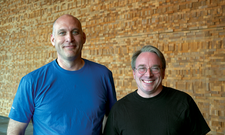Linus Torvalds and Greg Kroah-Hartman discuss the state of Linux
Kernel View

Linux creator Linus Torvalds describes some recent challenges and opportunities for the Linux kernel – and stable branch maintainer Greg Kroah-Hartman joins in with thoughts on diversity and competition.
In what's becoming an annual event, I sat down with Linus Torvalds at the Open Source Summit, Vancouver (Canada) to talk about the state of Linux. We chatted for over an hour and Greg Kroah-Hartman (maintainer of the stable branch of the Linux Kernel) also joined us. We talked about a wide range of topics, including the sustainability of Linux, threats to Linux (both from inside and outside), the state of security in the kernel world, the success of Linux on the desktop, his outbursts on the Linux kernel mailing list, privacy, diversity, and much more.
Following is an edited version of my interview with Linus, along with a special appearance from Greg Kroah-Hartman.
[UCC:intervewer-intervewee]Swapnil Bhartiya:[/UCC] It's been almost 27 years since Linux came to life. How are things in the Linux world?
[...]
Buy this article as PDF
(incl. VAT)
Buy Linux Magazine
Subscribe to our Linux Newsletters
Find Linux and Open Source Jobs
Subscribe to our ADMIN Newsletters
Support Our Work
Linux Magazine content is made possible with support from readers like you. Please consider contributing when you’ve found an article to be beneficial.

News
-
Introducing matrixOS, an Immutable Gentoo-Based Linux Distro
It was only a matter of time before a developer decided one of the most challenging Linux distributions needed to be immutable.
-
Chaos Comes to KDE in KaOS
KaOS devs are making a major change to the distribution, and it all comes down to one system.
-
New Linux Botnet Discovered
The SSHStalker botnet uses IRC C2 to control systems via legacy Linux kernel exploits.
-
The Next Linux Kernel Turns 7.0
Linus Torvalds has announced that after Linux kernel 6.19, we'll finally reach the 7.0 iteration stage.
-
Linux From Scratch Drops SysVinit Support
LFS will no longer support SysVinit.
-
LibreOffice 26.2 Now Available
With new features, improvements, and bug fixes, LibreOffice 26.2 delivers a modern, polished office suite without compromise.
-
Linux Kernel Project Releases Project Continuity Document
What happens to Linux when there's no Linus? It's a question many of us have asked over the years, and it seems it's also on the minds of the Linux kernel project.
-
Mecha Systems Introduces Linux Handheld
Mecha Systems has revealed its Mecha Comet, a new handheld computer powered by – you guessed it – Linux.
-
MX Linux 25.1 Features Dual Init System ISO
The latest release of MX Linux caters to lovers of two different init systems and even offers instructions on how to transition.
-
Photoshop on Linux?
A developer has patched Wine so that it'll run specific versions of Photoshop that depend on Adobe Creative Cloud.
